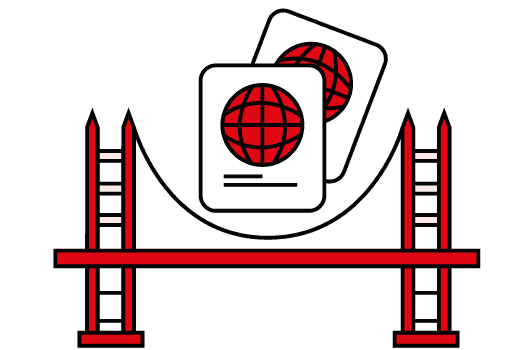Express Entry overview
Express Entry is a fast-track immigration system that enables individuals and families to become permanent residents of Canada. Since its introduction in 2015, it has become the primary avenue for skilled worker immigration to Canada and a popular choice among individuals looking to immigrate globally. However, it’s essential to understand that not everyone can immigrate to Canada through Express Entry.
This step-by-step guide is designed to help you determine if Express Entry is the right option for you and your family, if applicable. It will provide a clear and comprehensive understanding of the requirements and eligibility criteria, guiding you through the process step by step.
Immigration news directly into your inbox
What is Express Entry?
The Express Entry system is utilized by Immigration, Refugees and Citizenship Canada (IRCC) to quickly manage and evaluate applications from skilled workers through three federal economic immigration programs. Based on a point system, candidates are ranked against each other based on various criteria such as age, education, language skills, work experience and others. Only the highest-ranking candidates are invited to apply for Canadian permanent residency, making it a highly sought-after and efficient path for those looking to make a fresh start in Canada.
Step 1:Find out if you’re eligible
The Express Entry system is utilized by Immigration, Refugees and Citizenship Canada (IRCC) to quickly manage and evaluate applications from skilled workers through three federal economic immigration programs. Based on a point system, candidates are ranked against each other based on various criteria such as age, education, language skills, work experience and others. Only the highest-ranking candidates are invited to apply for Canadian permanent residency, making it a highly sought-after and efficient path for those looking to make a fresh start in Canada.
As part of the Express Entry process, Canada thoroughly screens all applicants for any criminal history or medical concerns that may render an individual inadmissible to the country.
To be eligible for the Federal Skilled Worker Program (FSWP) under Express Entry, you must meet the following criteria:
Work Experience: Have at least 12 months of continuous, full-time (or an equivalent amount of part-time) skilled work experience in a single occupation. The occupation must be classified at National Occupation Classification (NOC) Training, Education, Experience, Responsibilities (TEER) category 0, 1, 2, or 3.
Language Proficiency: Demonstrate proficiency in either English or French through an approved language test, such as IELTS or TEF, with a minimum score equal to Canadian Language Benchmark 7 (CLB 7).
Education: Possess a minimum education equivalent to the completion of a Canadian high school diploma. If your education was completed outside of Canada, you will need to obtain an Educational Credentials Assessment (ECA) that attests to the equivalent value of your education in Canada.
Points Grid: Obtain a minimum score of 67 points on the Federal Skilled Worker Points Grid, which assesses factors such as age, work experience, education, language proficiency, and adaptability.
Settlement Funds: Have sufficient funds to support your settlement in Canada without relying on social assistance. The specific amount required may vary depending on the size of your family.
To be eligible for the Canadian Experience Class (CEC), you must meet the following requirements:
Work Experience: Have at least 12 months of full-time (or equivalent part-time) skilled work experience in Canada in the last three years. The experience must have been obtained while holding a valid work permit and must be in one or more occupations classified as National Occupational Classification (NOC) Skill Type 0, Skill Level A or B. The 12 months of experience may be obtained through two different NOC codes as long as they are skilled positions and the work experience was obtained legally.
Language Proficiency: Meet the language requirements for your job, as outlined by the Canadian Language Benchmark, in speaking, reading, listening, and writing. These levels must be proven by taking an approved language test, such as IELTS or TEF.
Residency: Plan to live outside the province of Quebec.
Please note that work experience gained through self-employment and work experience gained while studying full-time do not qualify under the Canadian Experience Class. It is important to stay updated on the latest information on the Government of Canada’s website as the eligibility criteria for the CEC may change from time to time.
To be eligible for the Federal Skilled Trades Program (FSTP), you must meet the following criteria:
Language Proficiency: Show proficiency in either English or French by taking an approved language test and submitting the results. The minimum score required is Canadian Language Benchmark (CLB) 5 for speaking and listening, and CLB 4 for reading and writing.
Work Experience: Have at least two years of full-time work experience (or the equivalent in part-time work experience) in a skilled trade within the past five years. The work experience must be paid and demonstrate that you have the skills and experience to perform the essential duties of the occupation.
Job Offer or Certificate: Have a full-time job offer for a minimum of one year in the skilled trade from one or two Canadian employers, or hold a certificate of qualification in the skilled trade from a Canadian provincial or territorial authority.
Step 2:Check your score
We recommend checking your potential CRS score before creating a profile, as you will need your language test and Educational Credentials Assessment (ECA) to create your profile. By checking your score before obtaining these documents, you can verify that you have the minimum of 300 points necessary to be eligible for entry into Express Entry the pool.
If you meet the criteria for one of the Express Entry options and submit your profile, then you will be ranked against other applicants in the Express Entry pool using a Comprehensive Ranking System (CRS).
The CRS score is used to rank eligible candidates in the Express Entry pool, and the highest-ranking candidates are invited to apply for Canadian permanent residency through periodic draws.
To calculate your CRS score, the Express Entry system considers factors such as age, education, language proficiency, work experience, and other factors. The score is used to determine your place in the Express Entry pool and your chances of receiving an Invitation to Apply (ITA) for permanent residency.
Are you ready to get started, or not sure which option is best for you?
Find out how you can move to Canada.
Step 3:Get your documents ready
To submit your Express Entry profile, you’ll need to gather several important documents. These include:
Language Test Scores: All Express Entry applicants must demonstrate language proficiency in either English or French. You’ll need to provide official scores from an approved language test, such as the IELTS General Training exam for English or the TEF exam for French. The minimum required score varies based on the Express Entry program you’re eligible for.
Educational Credentials Assessment (ECA): The ECA is an evaluation of your non-Canadian education against Canadian standards. It’s mandatory for the Federal Skilled Worker Program, but it’s recommended for the Canadian Experience Class and Federal Skilled Trades Program candidates, as education is an important factor in your CRS score. If you completed your education in Canada, you don’t need to get an ECA.
Valid Passport: You’ll need a valid passport in order to submit your Express Entry profile. In exceptional cases, alternative identification documents may be accepted when obtaining a passport is not possible.
When applying for immigration to Canada with a spouse or common-law partner, it is crucial to assess each other’s qualifications before proceeding. The principal applicant must be designated in the Express Entry profile, and the majority of the Comprehensive Ranking System (CRS) score will be determined based on their credentials.
Step 4:Create an Express Entry profile
Your Express Entry profile is where you provide information about yourself.
If you are eligible, you will be accepted into the Express Entry pool of candidates and a Comprehensive Ranking System (CRS) score will be assigned to you.
Individuals who are eligible to apply for Express Entry must create a profile and submit it to the pool of applicants. This profile serves as a declaration of their intention to immigrate to Canada and acts as a basis for the ranking system.
The Comprehensive Ranking System (CRS) determines the ranking score of each candidate, which is a total of 1,200 points. Candidates have the opportunity to increase their score by making changes to their profile that positively impact their CRS score. The higher the CRS score, the greater the chances of receiving an invitation to apply for Express Entry.
The CRS score is a crucial factor in Express Entry draws as it sets the cutoff point for invitation rounds. The CRS score reflects the likelihood of a candidate’s economic success in Canada by considering various factors, such as language proficiency, education, work experience, and any job offers or provincial nominations.
Express Entry candidates have the opportunity to increase their Comprehensive Ranking System (CRS) score and improve their ranking position in the pool of applicants through various means. For example, having a valid job offer from a Canadian employer or receiving a provincial nomination can both result in additional points being awarded.
As a candidate in the Express Entry program, you have the option to create a profile in the Canada Job Bank to increase your chances of being selected for immigration. The Canada Job Bank is a free resource designed to connect Canadian employers with skilled workers who meet their specific needs. By creating a profile in the Canada Job Bank, you will increase your visibility to Canadian employers, making it easier for them to find and recruit you.
Please note that while registration in the Canada Job Bank used to be a mandatory requirement for Express Entry candidates, this is no longer the case as of June 2017.
Real Stories
Hear from real immigrants who have made the move to Canada.
Step 5:Get an invitation and apply
The candidates with the highest scores in the pool will receive invitations to apply.
Receiving an Invitation to Apply (ITA) from Immigration, Refugees and Citizenship Canada (IRCC) is an important step in the Express Entry process. IRCC conducts Express Entry draws on a regular basis, typically every two weeks, and invites candidates with a ranking above a certain threshold to apply for Canadian permanent residency. If a candidate is not selected in a draw, their profile will remain valid for 12 months before it expires. At that point, they may choose to submit a new profile.
Step 6:Submit your permanent residence application
Receiving an Express Entry Invitation to Apply (ITA) opens the door to submitting an application for Canadian permanent residency within 60 days. The application process requires detailed personal information and supporting documentation, which must be submitted electronically.
After submitting your Express Entry application, you will have to wait for a decision from Immigration, Refugees and Citizenship Canada (IRCC). Typically, around 80% of Express Entry applications are processed within a period of six months or less. If your application is approved, you will receive authorization to activate your permanent residency status in Canada.
Nicola Wightman
Nicola Wightman is a regulated Canadian Immigration Consultant (RCIC) under the College of Immigration and Citizenship Consultants (CICC). Her professional immigration consultant number is R706497.
Start Your Canadian Immigration Journey
Our experts make the process clear, stress-free, and successful, so you can move forward with confidence and focus on what matters most.

Get Started Today
"*" indicates required fields





